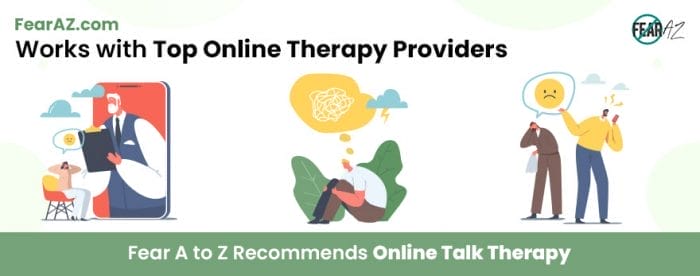The Best Tools to Overcome Your Phobia
Living with phobias can be frustrating because you miss out on normal things in life. Having no control over your phobia despite doing everything you can is the worst feeling.
There are a number of different therapies available to help you overcome your phobia, but two have shown a great deal of promise. But without any doubt the option that gets results, is affordable and is discrete is Online Talk Therapy. Fear A to Z has partnered with one of the most trusted online therapy providers. Online-Therapy.com – Use the 20% discount code THERAPY20
Online-Therapy.com offers tools and options to help you take control of your excessive fear or phobia including:
The Most Complete Online Therapy Toolbox
– Individual and couples therapy
– Weekly 45-minute live sessions
– Unlimited messaging with every plan
– A comprehensive 8-section program with 25 worksheets
– Daily worksheet replies (Mon-Fri)
– Exclusive yoga & meditation videos, a journal, activity plan & tests
– Instant therapist match and the flexibility to seamlessly change therapists
– The Premium plan, offering two weekly live sessions + express replies
– A full CBT program with daily therapist support
– Video, voice and text based sessions
– Tools like worksheets and journaling
– Affordable Plans with financial aid options
Due to their convenience and effectiveness, these therapies are becoming increasingly popular among people suffering from phobias.
However, do they really work, and what benefits do these therapies provide? More importantly, how are they better than traditional therapies?
The following information may help answer some of these questions.
Why Online Talk Therapy
In today’s fast-paced world, work and family commitments take up a great deal of your time. So, even if you’re thinking about getting therapy, you might not be able to find the time. This is where online talk therapy comes in to assist you.
Your therapist will be available for remote sessions during online therapy through your preferred medium. This could be in the form of a video call, chat, email, messaging, or a call session.
This ensures that your phobia therapy sessions remain consistent and uninterrupted. Maintaining consistency is crucial to getting over your fears.
Due to its convenience, privacy, and affordability, online therapy is becoming more popular.
Benefits of Online Talk Therapy
Online therapy has become the standard practice these days for depression, anxiety, and stress. However, those who are always busy and lack time to see a therapist will benefit most from online therapy.
Here are some of the benefits of online therapy:
Accessibility
One of the most significant benefits of online therapy is that it is accessible to everyone, regardless of age, gender, or where they live. People with disabilities who cannot travel to a therapist to treat their phobia can undergo treatment from the comfort of their homes.
Privacy
People who are uncomfortable seeking therapy can reduce their social stigma by getting treatment online. With an online counselor, they can talk privately about stress, life experiences, and problems without visiting a counselor’s office.
The patient is relieved of social embarrassment, as they know no one is watching him. Hundreds of people widely use and accept online therapy. Patients can receive the best treatment without hesitation due to these factors.
Cost-Effectiveness
People often think that online therapy is expensive, but the fact is it brings convenience to you as well as your therapist. So if you are concerned about the expense, online therapy will cost you way less than traditional therapy.
In addition to the lower costs, you may even discover channels that offer free healthcare services. For example, therapists may even offer free trial sessions. After the trial session, you may choose to continue with a fee-for-service arrangement if the therapy meets your needs.




